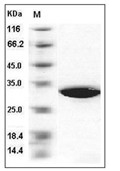- Remove All
 Your shopping cart is currently empty
Your shopping cart is currently empty
SULT1A1 Protein, Human, Recombinant (His)
Sulfate conjugation catalyzed by cytosolic sulfotransferase (SULT) enzymes. The SULTs are Phase II drug-metabolizing enzymes that catalyze the addition of a sulfuryl moiety to both endogenous compounds, including steroids and neurotransmitters, and certain xenobiotics, including N-hydroxy-2-acetylaminoflourine and phenolic compounds, like alpha-naphthol. SULTs may be involved in the individual genetic disposition, species differences, and organotropisms for toxicological effects of chemicals. Particularly SULT1A1 (Sulfotransferase family, cytosolic, 1A, phenol-preferring, member 1), a member of the sulfotransferase 1 subfamily, which is a major pathway for drug metabolism in humans. Humans have at least 10 functional SULT genes. There has been an explosion in information on sulfotransferase polymorphisms and their functional consequences. An Arg213His polymorphism in SULT1A1 has a strong influence on the level of enzyme protein and activity in platelets, which have been widely used for phenotyping. Statistically significant associations were observed between the SULT1A1 genotype (Arg213His) and age, obesity and certain neoplasias (mammary, pulmonary, esophageal and urothelial cancer). Furthermore, the polymorphism of the SULT1A1 may be closely associated with breast cancer.

SULT1A1 Protein, Human, Recombinant (His)
| Pack Size | Price | Availability | Quantity |
|---|---|---|---|
| 50 μg | $600 | In Stock |
Product Information
| Biological Activity | Activity testing is in progress. It is theoretically active, but we cannot guarantee it. If you require protein activity, we recommend choosing the eukaryotic expression version first. |
| Description | Sulfate conjugation catalyzed by cytosolic sulfotransferase (SULT) enzymes. The SULTs are Phase II drug-metabolizing enzymes that catalyze the addition of a sulfuryl moiety to both endogenous compounds, including steroids and neurotransmitters, and certain xenobiotics, including N-hydroxy-2-acetylaminoflourine and phenolic compounds, like alpha-naphthol. SULTs may be involved in the individual genetic disposition, species differences, and organotropisms for toxicological effects of chemicals. Particularly SULT1A1 (Sulfotransferase family, cytosolic, 1A, phenol-preferring, member 1), a member of the sulfotransferase 1 subfamily, which is a major pathway for drug metabolism in humans. Humans have at least 10 functional SULT genes. There has been an explosion in information on sulfotransferase polymorphisms and their functional consequences. An Arg213His polymorphism in SULT1A1 has a strong influence on the level of enzyme protein and activity in platelets, which have been widely used for phenotyping. Statistically significant associations were observed between the SULT1A1 genotype (Arg213His) and age, obesity and certain neoplasias (mammary, pulmonary, esophageal and urothelial cancer). Furthermore, the polymorphism of the SULT1A1 may be closely associated with breast cancer. |
| Species | Human |
| Expression System | E. coli |
| Tag | N-His |
| Accession Number | P50225-1 |
| Synonyms | TSPST1,sulfotransferase family, cytosolic, 1A, phenol-preferring, member 1,STP1,STP,ST1A3,ST1A1,PST,P-PST,HAST1/HAST2 |
| Construction | A DNA sequence encoding the human SULT1A1 (P50225-1) (Glu 2-Leu 295) was fused with a polyhistidine tag at the N-terminus. Predicted N terminal: Met |
| Protein Purity | > 95 % as determined by SDS-PAGE  |
| Molecular Weight | 35 kDa (predicted); 32 kDa (reducing conditions) |
| Endotoxin | Please contact us for more information. |
| Formulation | Lyophilized from a solution filtered through a 0.22 μm filter, containing 50 mM Tris, 150 mM NaCl, 10% glycerol, pH 8.0.Typically, a mixture containing 5% to 8% trehalose, mannitol, and 0.01% Tween 80 is incorporated as a protective agent before lyophilization. |
| Reconstitution | A Certificate of Analysis (CoA) containing reconstitution instructions is included with the products. Please refer to the CoA for detailed information. |
| Stability & Storage | It is recommended to store recombinant proteins at -20°C to -80°C for future use. Lyophilized powders can be stably stored for over 12 months, while liquid products can be stored for 6-12 months at -80°C. For reconstituted protein solutions, the solution can be stored at -20°C to -80°C for at least 3 months. Please avoid multiple freeze-thaw cycles and store products in aliquots. |
| Shipping | In general, Lyophilized powders are shipping with blue ice. |
| Research Background | Sulfate conjugation catalyzed by cytosolic sulfotransferase (SULT) enzymes. The SULTs are Phase II drug-metabolizing enzymes that catalyze the addition of a sulfuryl moiety to both endogenous compounds, including steroids and neurotransmitters, and certain xenobiotics, including N-hydroxy-2-acetylaminoflourine and phenolic compounds, like alpha-naphthol. SULTs may be involved in the individual genetic disposition, species differences, and organotropisms for toxicological effects of chemicals. Particularly SULT1A1 (Sulfotransferase family, cytosolic, 1A, phenol-preferring, member 1), a member of the sulfotransferase 1 subfamily, which is a major pathway for drug metabolism in humans. Humans have at least 10 functional SULT genes. There has been an explosion in information on sulfotransferase polymorphisms and their functional consequences. An Arg213His polymorphism in SULT1A1 has a strong influence on the level of enzyme protein and activity in platelets, which have been widely used for phenotyping. Statistically significant associations were observed between the SULT1A1 genotype (Arg213His) and age, obesity and certain neoplasias (mammary, pulmonary, esophageal and urothelial cancer). Furthermore, the polymorphism of the SULT1A1 may be closely associated with breast cancer. |
Dose Conversion
Calculator
Tech Support

Copyright © 2015-2025 TargetMol Chemicals Inc. All Rights Reserved.


